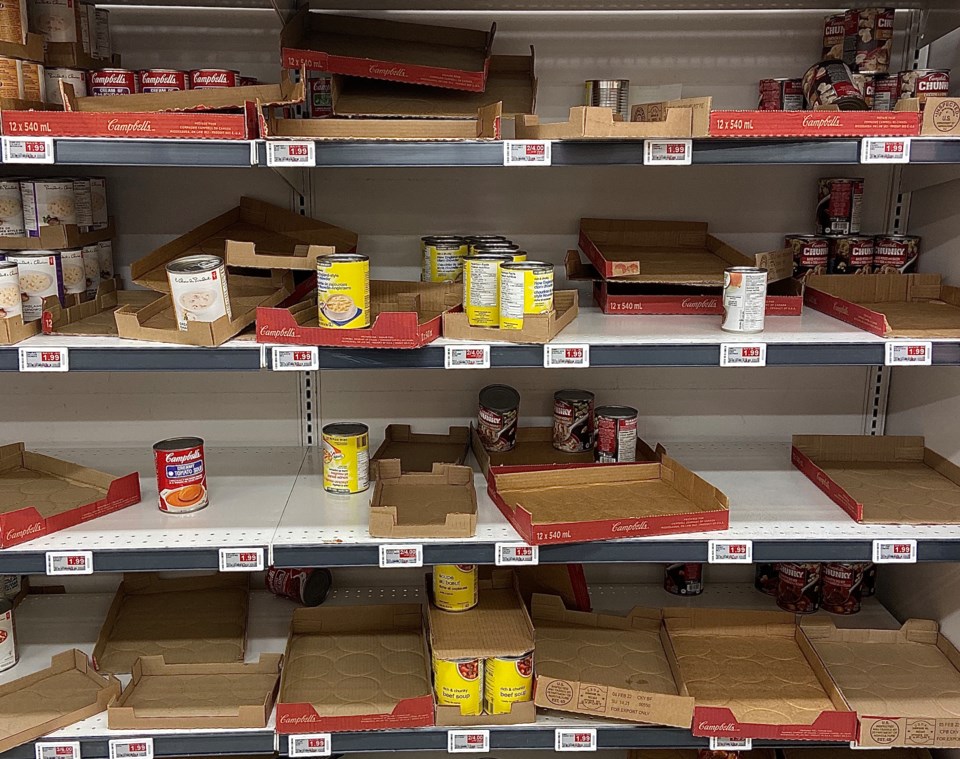While shelves in grocery stores across Canada are rapidly emptying out of fear of food shortages during the COVID-19 pandemic, food experts at the University of Guelph have one message: Don’t panic.
“We have not fundamentally changed our demand for food or fundamentally changed our demand for toilet paper or many of life's basic necessities. We simply panic bought,” said professor Evan Fraser.
Fraser holds the Canada Research Chair in Global Food Security and studies food security, food prices, rural agricultural policy and how each is affected by climate change.
While 70 per cent of the food Canada consumes is produced in Canada, food economist professor Mike von Massow says the shortages seen in grocery stores has nothing to do with issues of production or availability further up in the supply chain.
“I think our food supply chain is both robust and resilient and the shortages we’ve seen in grocery stores have been temporary because we’ve bought a higher quantity than usual and we caught the supply chain by surprise,” said von Massow.
Fraser says Canada has adopted a ‘just enough, just in time’ approach to food where industries manage inventory at a very high level of efficiency. And with that high level of efficiency, we’re able to benefit from year-round produce, low cost and diversity.
With Canada being a global net food exporter, (which means it exports more food than it imports,) Fraser says that in itself is a good position to be in.
“We have extremely sophisticated and highly productive farms,” says Fraser.
“We are a net importer in fruits and vegetables so if there’s anywhere we will be a little vulnerable, it will be in fruits and vegetables. But we’re moving into the growing season to the point where Ontario actually does have an abundant supply of fruits and vegetables. And it won’t be many weeks before we start seeing the start of our local harvest.”
On Monday, Loblaws CEO Galen G. Weston issued a statement saying Loblaws stores are not running out of essential food or supplies, and that their supply chain food and teams are adjusting to the spikes of volume to get items back on the shelf.
Weston also added that the corporation will not be taking advantage of COVID-19 by surging the prices of a single item in their stores.
Fraser says while Canada has an efficient food system, grocery stores might need to be holding on to a higher inventory in order to build some resilience and self-sufficiency in the long run.
“If there’s anything that climate change and the coronavirus is suggesting, it is that the future is going to have shocks in it,” says Fraser.
He says the world as a whole is becoming more prone to shock with an increasing global population and increase demand for food.
“Epidemiologists have known forever that when you take any population and you increase the number of people and you increase their mobility, you’re going to get viruses moving around and bacteria moving around,” says Fraser.
“We do see short change supply issues and one way of protecting ourselves against that sort of thing from happening in the future is to invest in a little bit more regional self-sufficiency.”
Earlier this week, the government of Ontario strongly recommended the closure of all restaurants in the province, with the exception of restaurants that can shift to takeout methods.
“If we see restaurants not taking take out orders because they’re not equipped for takeout, we'll probably see some of these restaurants close in the short run which will affect the demand for food further up the value chain but then we will also probably see a diversion,” says van Massow.
“All of those meals that you were eating out, we still need to eat so we will continue to order takeout or buy from the grocery store which again will give them some unanticipated demand but they will be able to respond to it.”
He says while that doesn’t mean that people in the hospitality and restaurant sector won’t feel some pain, there are many industries that will have to cut down on staff or lay staff off in the short run because of a decrease in demand or because of a mandated closure.
Van Massow says if the US Canada border closes to trade, then there might be a decrease in the availability of some food products. However, Canadians still need not worry because 70 per cent of Canada’s food will still come from within Canada.
“That’s not going to change, we’re still producing, we’re not going to run out, the system is robust and resilient,” says van Massow.
